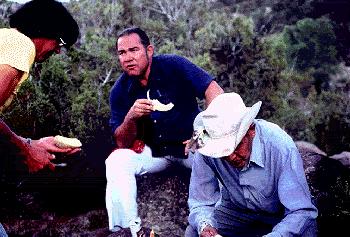|
|
Ortiz Center Designed to Bring Native Voices Into Academia In Honor of Alfonso Ortiz Alfonso Ortiz Research Center
by Scott Sandlin ABQJournal Staff Writer
 Ideas come
spilling out of Beverly Singer, director of the fledgling Alfonso Ortiz Center for Intercultural Studies at the
University of New Mexico.
Ideas come
spilling out of Beverly Singer, director of the fledgling Alfonso Ortiz Center for Intercultural Studies at the
University of New Mexico.
The center, which has its grand opening today at the Maxwell Museum on campus, was officially born in January with
a $500,000 challenge grant from the National Endowment for the Humanities. Singer has been on board since June,
envisioning prospective programs, writing grants and thinking about fund raising.
The center, named for the late anthropologist, scholar and Indian rights activist Alfonso Ortiz of San Juan Pueblo,
aims to use new technologies to give access to indigenous and other cultural voices within the academic study of
anthropology.
One program would focus on the acequia, or ditch system, in New Mexico. Another, a joint project with the Museum
of New Mexico and Boston University for a traveling exhibition, will bring together 15 Arizona and New Mexico artists.
The Ortiz Center will be operated by UNM's Department of Anthropology and the Maxwell Museum of Anthropology, but
it will function independently.
Where Maxwell's focus is exhibitions and artifacts, and the anthropology faculty's is teaching and research, the
Ortiz Center is about people, Singer says.
It is a place for people to share ideas and dialogue, she says. After raising the minimum $1.5 million in private
funds to match the federal grant, it will have its own physical space as well.
"Over the last few years, there's been a real interest in looking at public anthropology in a more realistic
light," Singer says, explaining the genesis of the center. "That has come from the faculty recognizing
the need to work more closely with the communities who are being studied so they become interpreters of their own
experience, and that there is a discussion of culture from that perspective."
As an example of "public anthropology," Singer referred to a graduate student who used museum collections
and the anthropology lab to help Acoma potters solve a problem of their pots cracking. A small exhibit was organized
about the research.
The center will provide support for storytellers, healers and other scholars from cultures not only in the Southwest,
but also in Latin America, Africa and Asia.
There are plans to launch a "virtual museum" to bring the art and culture of New Mexico and the world
to a wider audience using the Internet, and to sponsor exhibits, music, dance and other performances.
http://www.indigenouspeople.org/natlit/ortiz.htm
http://www.unm.edu/~rleonard/neh.htm
![]()
|
|
| Canku Ota is a free Newsletter celebrating Native America, its traditions and accomplishments . We do not provide subscriber or visitor names to anyone. Some articles presented in Canku Ota may contain copyright material. We have received appropriate permissions for republishing any articles. Material appearing here is distributed without profit or monetary gain to those who have expressed an interest. This is in accordance with Title 17 U.S.C. section 107. |
|
Canku Ota is a copyright of Vicki Lockard and Paul Barry. |
|
The "Canku Ota - A Newsletter Celebrating Native America"
web site and its design is the Copyright © 1999 of Paul C. Barry. |